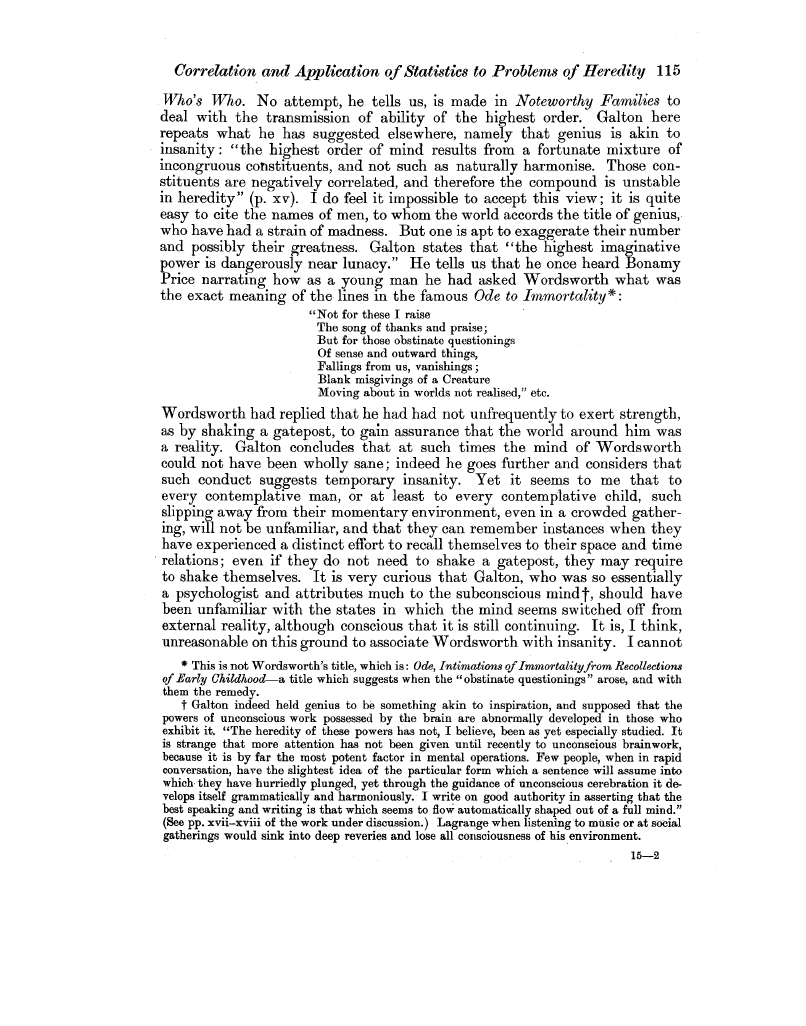| ||||||

OCR Rendition - approximate
Correlation and Application of Statistics to Problems of Heredity 115 Who's Who. No attempt, he tells us, is made in Noteworthy Families to deal with the transmission of ability of the highest order. Galton here repeats what he has suggested elsewhere, namely that genius is akin to insanity : "the highest order of mind results from a fortunate mixture of incongruous constituents, and not such as naturally harmonise. Those constituents are negatively correlated, and therefore the compound is unstable in heredity" (p. xv). I do feel it impossible to accept this view; it is quite easy to cite the names of men, to whom the world accords the title of genius, who have had a strain of madness. But one is apt to exaggerate their number and possibly their greatness. Galton states that "the highest imaginative power is dangerously near lunacy." He tells us that he once heard Bonamy Price narrating how as a young man he had asked Wordsworth what was the exact meaning of the lines in the famous Ode to Immortality*: "Not for these I raise The song of thanks and praise; But for those obstinate questionings Of sense and outward things, Fallings from us, vanishings ; Blank misgivings of a Creature Moving about in worlds not realised," etc. Wordsworth had replied that he had had not unfrequently to exert strength, as by shaking a gatepost, to gain assurance that the world around him was a reality. Galton concludes that at such times the mind of Wordsworth could not have been wholly sane; indeed he goes further and considers that such conduct suggests temporary insanity. Yet it seems to me that to every contemplative man, or at least to every contemplative child, such slipping away from their momentary environment, even in a crowded gathering, will not be unfamiliar, and that they can remember instances when they have experienced a distinct effort to recall themselves to their space and time relations; even if they do not need to shake a gatepost, they may require to shake themselves. It is very curious that Galton, who was so essentially a psychologist and attributes much to the subconscious mind t, should have been unfamiliar with the states in which the mind seems switched off from external reality, although conscious that it is still continuing. It is, I think, unreasonable on this ground to associate Wordsworth with insanity. I cannot * This is not Wordsworth's title, which is: Ode, Intimations of Immortalityfrom Recollections of Early Childhood-a title which suggests when the "obstinate questionings" arose, and with them the remedy. t Galton indeed held genius to be something akin to inspiration, and supposed that the powers of unconscious work possessed by the brain are abnormally developed in those who exhibit it. "The heredity of these powers has not, I believe, been as yet especially studied. It is strange that more attention has not been given until recently to unconscious brainwork, because it is by far the most potent factor in mental operations. Few people, when in rapid conversation, have the slightest idea of the particular form which a sentence will assume into which• they have hurriedly plunged, yet through the guidance of unconscious cerebration it develops itself grammatically and harmoniously. I write on good authority in asserting that the best speaking and writing is that which seems to flow automatically shaped out of a full mind." (See pp. xvii-xviii of the work under discussion.) Lagrange when listening to music or at social gatherings would sink into deep reveries and lose all consciousness of his environment. 15-2
|